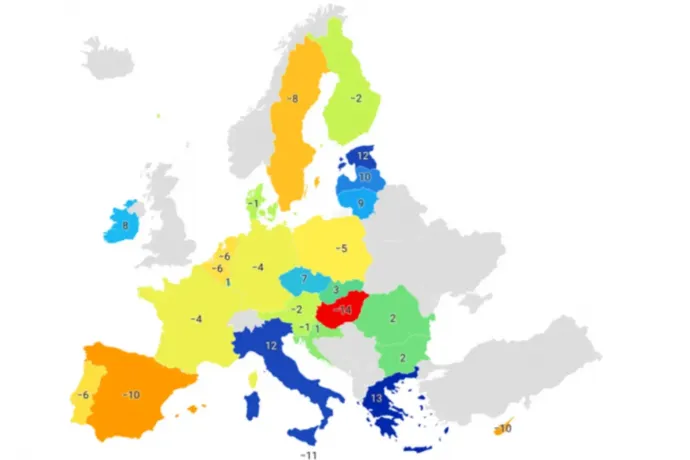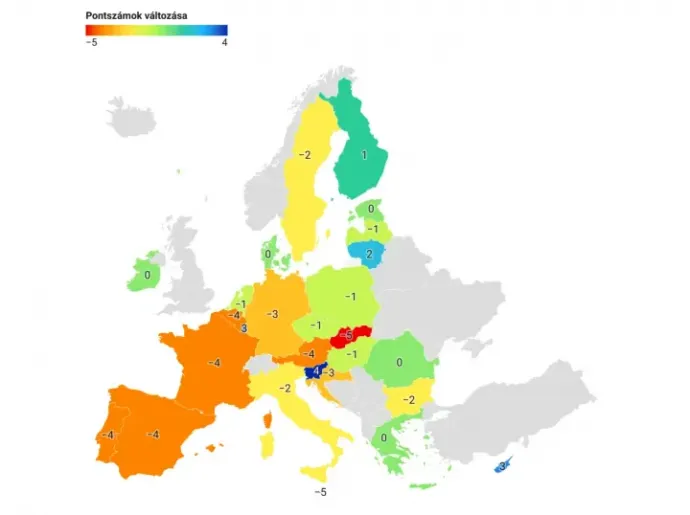Corruption is an integral part of the system in Hungary, Transparency International says

In 2024, Hungary ranked last among member states of the European Union in Transparency International's (TI) global corruption list, with 41 points. This put the country in 82nd place out of 180 countries.
The ranking is based on the organisation's corruption perceptions index, which reveals that businesspeople and experts in Hungary perceive the level of corruption in the public sector to be the same as that in the military junta-led Burkina Faso or in Cuba under a communist dictatorship. Compared to its result from 2023, Hungary lost one point, and slid six places lower on the list. This means that two years after anti-corruption measures were introduced in the country following pressure from the EU, people's perception of the level of corruption in the country is even a bit worse than a year earlier.
Transparency International produces the Corruption Perceptions Index (CPI) each year by using 13 surveys and assessments from 12 different organisations, based on a complex methodology. What they are examining is how high those affected – in this case businesspeople and experts – perceive the risk of corruption to be in a given country. The index is measured on a scale of 0 to 100, and the higher a country scores, the better people perceive the corruption situation to be.
Although there are usually slight variations, generally the same countries are found on the top and the bottom of the list year after year. After 2023, Denmark again topped the list (with 90 points), which includes 180 countries, while Venezuela (10 points), Somalia (9 points) and South-Sudan (8 points) are at the bottom.
This year, Hungary's score was 41 points, which is less than last year's score, putting it in 82nd place. Hungary shares this ranking with five other countries, including the Republic of South Africa, Tanzania and Trinidad and Tobago, where the perception of corruption is similar to that of Hungary.
In 2012, Hungary was ranked 46th with 55 points, which means that in the last twelve years, the country has slid down by a total of 14 points and 36 places in the global corruption ranking. The rate of decline is significant by international standards as well.
Hungary's position has also worsened when compared with other EU member states: in 2014, Hungary ranked 21st (with 54 points) among the then 28-member European Union, and in 2020 it was in a three-way tie with Romania and Bulgaria for last place, but since then, the country was first passed by its eastern neighbour, and then Bulgaria as well.
The gap between the EU Member States of Central and Eastern Europe keeps widening, with first-placed Estonia and last-placed Hungary now 35 points apart. The countries of the Visegrád group, (the Czech Republic, Poland, Hungary and Slovakia), are now (with the exception of Hungary) in the mid- to lower middle of the EU table. Compared to 2023, Slovakia's performance fell by 5 points (and 12 places), which – in a tie with Malta – is the biggest drop in the EU. According to Transparency, this drop may be linked to the fact that since September 2023, the country has again been under the leadership of a government led by Robert Fico, who is on good terms with Viktor Orbán.

The scores of EU member states show that, globally, Europe continues to be the best performer, but the worsening trend of previous years has continued. Of the 27 member states, the scores of 16 countries have worsened, meaning that Transparency has found that their resistance to corruption has decreased compared to a year ago. Several Western European countries, including Germany, Belgium, France and neighbouring Austria, have seen a significant deterioration, although these countries are still well above the Hungarian level with their scores of 75, 69 and 67 respectively.
Stalled reforms and partial solutions
Although on paper, the Hungarian government took several steps to improve the rule of law and fight corruption in 2022, Transparency International Hungary says that more than two years on, it is clear that the reform package was not sufficient for breaking systemic corruption. The main reason for this is that the Hungarian government has on several occasions sabotaged the fulfilment of the requirements of the conditionality mechanism and has also several times misled the European Commission with sham measures," the organisation said in its report, which was released at the same time as the global survey.
The Integrity Authority, which TI says does not have a sufficient legal mandate – it cannot investigate and sanction independently – to do its job properly, has proved to be a half-solution. The establishment of the Anti-Corruption Task Force (Korrupció Ellenes Munkacsoport), which operates alongside the Integrity Authority, has not proven effective, nor has it been possible to create the basic conditions for the verification and accountability of politicians' assets in the asset declaration system.
Other elements of the 2022 anti-corruption reform package have proven inadequate because even if fully implemented, the measures required by the EU would not have been sufficient to root out corruption. This includes the judicial reform, which the EU accepted and afterward unlocked some of the funds, but this was not sufficient to substantially alleviate the pressure on the Hungarian courts coming from the government. A good example of this is the fact that the government has set conditions for a pay rise for judges. The reform of the criminal procedure, the measures concerning the availability of data of public interest and the regulation of the public interest trusts (KEKVA) all fall under this category.
Transparency International Hungary's report in particular highlights that systemic corruption has already cost the country EU funds, with more than €1 billion lost permanently at the end of 2024. The EU's conditionality procedure has not produced a breakthrough. They note that TI had also hoped that the measures imposed by the EU and implemented by the government would improve the situation, but this has not happened.
Speaking at a press event on Tuesday presenting Hungary's index, József Péter Martin, Executive Director of Transparency International Hungary, said that the country's CPI demonstrates that "corruption is not a consequence of NER, but an integral part of it".
The government does not want to eradicate corruption and restore the rule of law, it just wants to free up funds without making any substantive changes.
NER is short for Nemzeti Együttműködés Rendszere, meaning ’System of National Cooperation.’ The term was coined by the Orbán government after their election victory in 2010 to refer to the changes in government that they were about to introduce. By now, NER has become a word in its own right, and is used in colloquial Hungarian to refer to Fidesz' governing elite, complete with the politicians and the oligarchs profiting from the system.
There has been no meaningful improvement in public procurements over the past year either, targets set by the EU were only met for EU-funded procedures – the share of single-bid procurements fell to 5.5 per cent, while the 24 per cent threshold required for domestically sourced tenders was not met, and the 15 per cent target for 2026 is still a long way off.
The public procurement market remains highly concentrated and the state’s measures have not significantly increased competition. The transparency of public procurement data remains low. "Overall, in Hungary, public procurement remains a hotbed of corruption," said Martin. The state allocates an amount equivalent to 4.6 percent of the GDP, or nearly 3,700 billion forints through public procurement every year, and a significant part of this ends up with contractors who have close ties to the government. In regard to public procurements, there is no sign of a positive change in the near future. According to Martin, "the government wants more and more public money to flow to pro-government contractors".
Transparency's report specifically highlights the growing prevalence of companies and investment structures that hide the identity of their owners in Hungary. Through state actors investing hundreds of billions of forints of public money in privately owned funds, private equity funds have become a key instrument for siphoning out public funds, the report points out.
Speaking at the report's presentation, József Péter Martin, Executive Director of Transparency International Hungary, said that recent socio-economic indicators confirm that in the season of the Orbán regime that has passed since the Covid epidemic, Hungary has been caught in a vicious circle: corruption undermines economic performance. As in previous years, in 2024, the correlation between economic performance and corruption remained strong in the EU.
Martin pointed out that while Hungary is the most corrupt member state in the European Union, its economic performance is only modest. According to the report, Hungary ranks among the last in the EU in almost all economic indicators. We are 4th from bottom in terms of GDP per capita, ahead of only Greece in productivity and at the bottom in household consumption. According to Martin, one of the reasons for the almost half-decade-long decline of the Hungarian economy – which is showing signs of crisis in many respects – is the systemic corruption and the institutional system that underpins it and which has been captured by the ruling elite, and often serves private interests.
According to TI, 2024 saw several major corruption cases in Hungary, the most significant of which were the real estate developments in the capital, carried out by pro-government circles and costing hundreds of billions of forints. The 35-year motorway and waste-processing concessions and the ill-famed canopy walkway with no forest are good examples of this. At the same time, according to TI, the crackdown on petty corruption has been relatively successful, with police bribery and payoffs now virtually non-existent, and tax evasion and VAT fraud on the decline.
For more quick, accurate and impartial news from and about Hungary, subscribe to the Telex English newsletter!